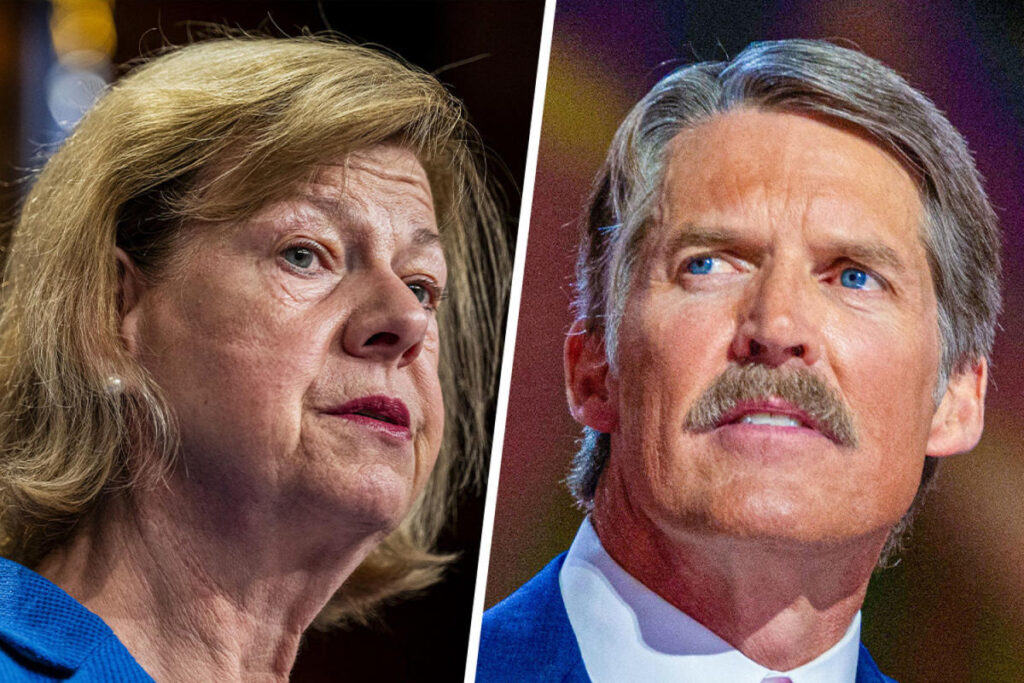In Wisconsin’s tightly contested U.S. Senate race, the Republican candidate Eric Hovde has concentrated his campaign’s closing arguments on critiquing the finance career of Democratic Senator Tammy Baldwin’s girlfriend, Maria Brisbane. Hovde’s ads consistently mention Baldwin’s same-sex relationship, portraying Brisbane as a “Wall Street exec” who profits from industries under Baldwin’s regulation. For instance, in recent television ads, Hovde has claimed that while Baldwin resides in her girlfriend’s expensive New York City condo, ordinary Wisconsin families suffer from high inflation and other economic challenges. This strategy emphasizes Hovde’s goal of painting Baldwin and Brisbane as disconnected from the needs of Wisconsin voters, arguing that their lifestyle reflects privilege and out-of-touchness.
Baldwin, the first openly gay woman elected to Congress and the U.S. Senate, asserts that Hovde’s focus on her personal life is a distraction from more pressing issues. As she vies for a third Senate term, she argues that such tactics are typically off-limits in political discourse and merely serve Hovde’s need to shift attention from his political vulnerabilities. She emphasizes that her accomplishments and record should be the focal point of the debate instead of her personal relationships. During a debate, Baldwin firmly told Hovde to keep her personal life out of his campaign narratives, reflecting her discontent with the personal nature of his attacks.
Hovde’s campaign strategy has been to not only attack Baldwin’s relationship with Brisbane but also question her professional integrity, implying a conflict of interest. Hovde’s spokesperson defends this approach by citing Baldwin’s previous statements, wherein she indicated that the partners of gay and lesbian officeholders should be subjected to the same financial disclosure requirements as heterosexual spouses. However, Baldwin clarifies that she does not sit on any committees that directly oversee Wall Street issues, attempting to dismantle the narrative that she is improperly benefiting from Brisbane’s career.
The response to Hovde’s attacks has included pushback from LGBTQ rights organizations and Baldwin’s campaign, which argue that these tactics reveal a broader hostility toward LGBTQ individuals. Leaders from organizations like GLAAD and the Human Rights Campaign have criticized Hovde’s ads as divisive and hateful and have emphasized that Baldwin’s sexual orientation should not be a focal point in the election. These organizations endorse Baldwin, pointing to her record of supporting equality and emphasizing the need for leaders who can effectively address the issues facing Wisconsin residents.
Beyond personal attacks on Baldwin’s relationship, Hovde’s campaign has also pushed false narratives around transgender issues, echoing tactics employed by other Republican candidates nationwide. Ads have mischaracterized Baldwin’s positions and inaccurately claimed she supports initiatives that undermine parental rights regarding minors and transgender care. As the race heats up in the final weeks, these personal and polarizing attacks have significantly shaped the campaign’s climate.
Amidst the heightened tension and competing narratives, Baldwin’s allies have highlighted Hovde’s residency in California for much of the past few years, framing him as out of touch with Wisconsin’s citizens. Hovde’s claim of representing working Wisconsinites is undercut by Baldwin’s emphasis on his perceived distance from the community. As the election looms, both candidates continue to leverage personal narratives and highlight their opponent’s weaknesses in a contest that will be pivotal for the Senate’s balance of power.

